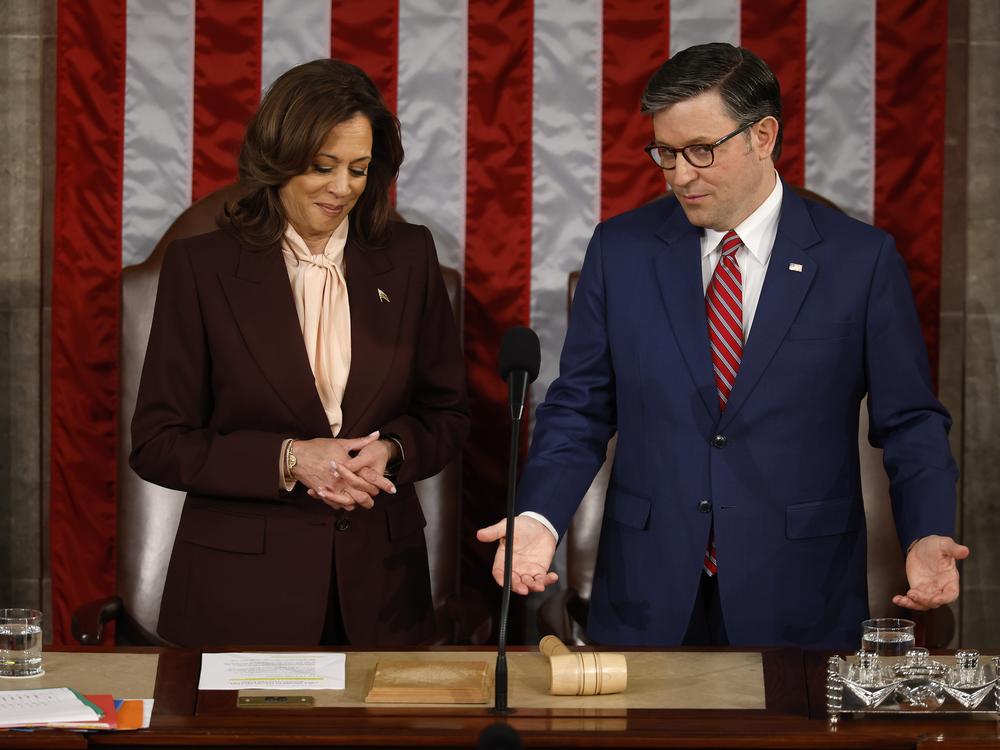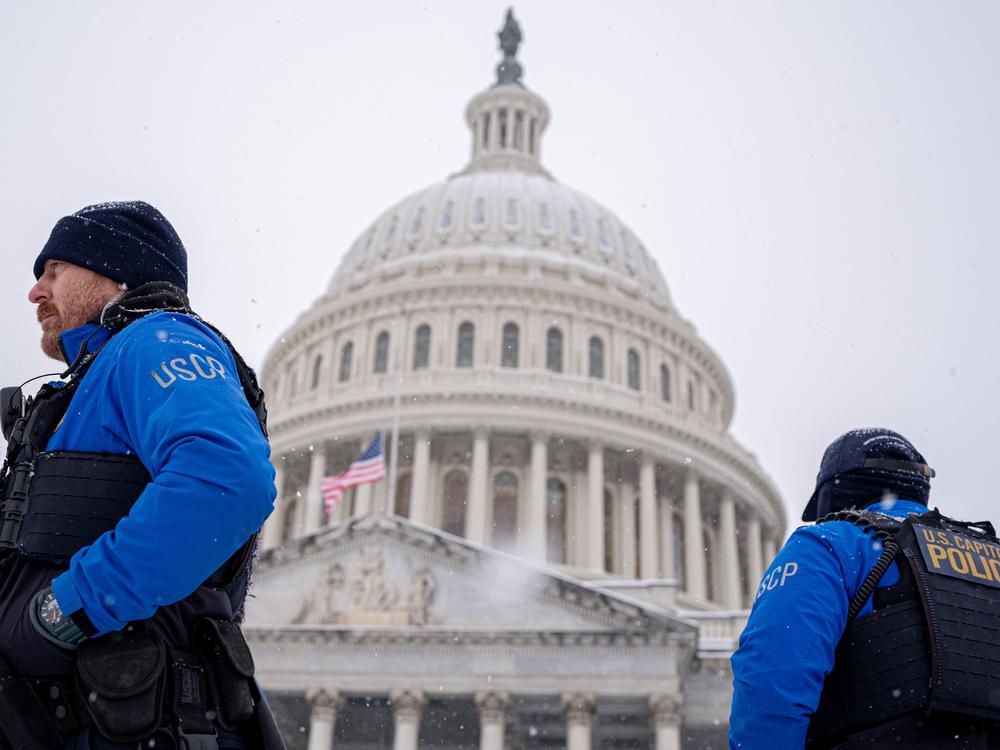Section Branding
Header Content
Under the shadow of the Jan. 6, 2021 riot, Congress certifies the 2024 election
Primary Content
Congress convened Monday in the midst of a snowstorm to certify President-elect Donald Trump's election victory in a smooth and orderly process, in stark contrast to four years ago when throngs of Trump's supporters breached security barriers at the U.S. Capitol and stormed the building to try to overturn the 2020 election results.
Vice President Harris, who lost the presidential election to Trump, oversaw the proceedings certifying Trump's win and announced the final tally: 312 to 226.
Unlike four years ago, there were no objections to the certification of any state's election certificate during the hour-long joint session of Congress, a return to what's normally a mundane bureaucratic process of members fulfilling a constitutional duty to officially oversee the counting of electoral votes.
While some Democrats objected to Trump's 2016 electoral win, none did on Monday.
Four tellers — two from each chamber — took turns announcing each state's electoral certificates were "regular in form and authentic."
Lawmakers from either aisle politely applauded after each result was read. Vice President-elect JD Vance had a front row seat to his own election certification, standing and clapping when the tallies of his home state — Ohio — were read in his favor.
There was a standing ovation after Harris concluded the certification — the only time members on both sides of the aisle clapped together.
After the certification Harris told reporters on Capitol Hill that the ceremony was "what should be the norm and what the American people should be able to take for granted — which is one of the most important pillars of our democracy is that there will be a peaceful transfer of power."
She added that she "did what I've done my entire career" and fulfilled the constitutional duty of her position.
"I do believe very strongly that America's democracy is only as strong as our willingness to fight for it."
In the shadow of 2021
"We fight like hell. And if you don't fight like hell, you're not going to have a country anymore," Trump told his supporters in 2021 during a rally on the ellipse outside the White House hours before the certification process was set to begin.
Trump called on his vice president, Mike Pence, not to certify the electoral count in favor of Joe Biden. Once Pence made it clear he would not intervene, some of the protesters who marched to the Capitol after Trump's speech chanted, "hang Mike Pence."
On Monday, Pence praised "the peaceful transfer of power" on social media, congratulated Trump and Vance, and commended lawmakers from both parties for the smooth process. He also praised Harris, noting "it being particularly admirable that Vice President Harris would preside over the certification of a presidential election that she lost."
House Speaker Mike Johnson, who authored a legal brief in support of the effort to dispute the results as a rank and file member in 2021, sat next to Harris on the dais Monday.
Ahead of the ceremony, many Democratic lawmakers issued statements marking their concerns about Trump's actions in 2021 and declaring the process would move forward without any disruption. Several also argued the GOP was essentially trying to rewrite history about that day.
Republicans largely didn't acknowledge the violence or unrest following the scene that delayed the 2021 certification until early morning hours of Jan. 7, 2021.
Certification: 2021 versus 2025
In response to the attack in 2021, Congress passed election reform measures to clarify the certification process.
The 2024 election is the first presidential election to be certified under the new law — the Electoral Count Reform Act (ECRA).
Previously, a single member of the House and one from the Senate could file an objection to a state's electoral count. This opened up a potentially days-long debate period with no clear resolution if the two chambers then disagreed with each other on their respective votes on the objection.
The original law, which passed in 1887, also wasn't clear about what sort of issues could qualify as a challenge.
The ECRA raised the bar on objections to election results (which have already been certified by each individual state). Under the new law, an objection is only valid if it is signed by one-fifth of each chamber of Congress.
The law significantly narrows the reasons a lawmaker may object to results, making clear that partisan differences over election policies in a certain state aren't a valid reason to object to the state's results.
The Department of Justice on Monday said it has charged 1,583 people with crimes in federal court in connection with the events of Jan. 6, 2021. Charges cover assaults against more than 140 Capitol and District of Columbia police officers and damage to the Capitol and other government property. The FBI is also still trying to find others wanted for violent assaults that day.
Separately, lawyers for convicted Proud Boys leader Henry "Enrique" Tarrio on Monday renewed their request for a pardon from Trump. Tarrio has been serving a 22-year prison sentence for seditious conspiracy for his role in the attack.
Tarrio has been held in special housing units during his incarceration, limiting his interactions with other prisoners and his movements outside his cell. His lawyer told NPR that kind of isolation can lead to major mental health problems.
The appeal comes as Trump has said he wants to pardon at least some of the defendants convicted in the Capitol riot.
Trump will be inaugurated on January 20 on the West front of the Capitol.
NPR's Miles Parks and Carrie Johnson contributed to this story.


